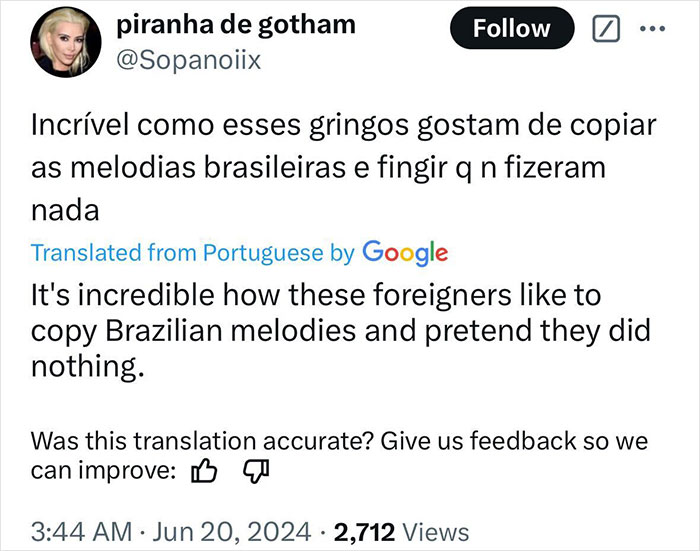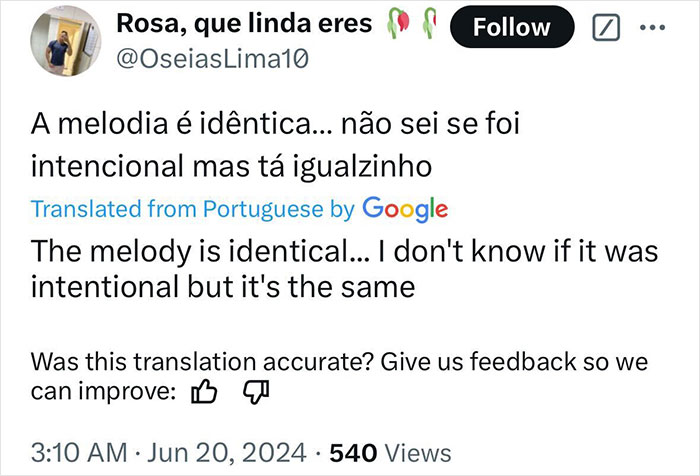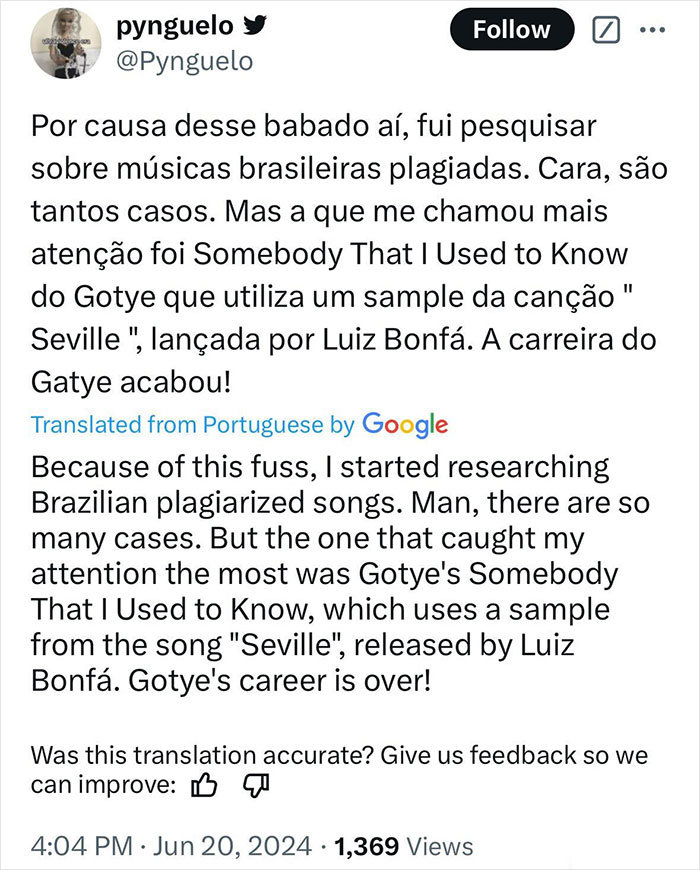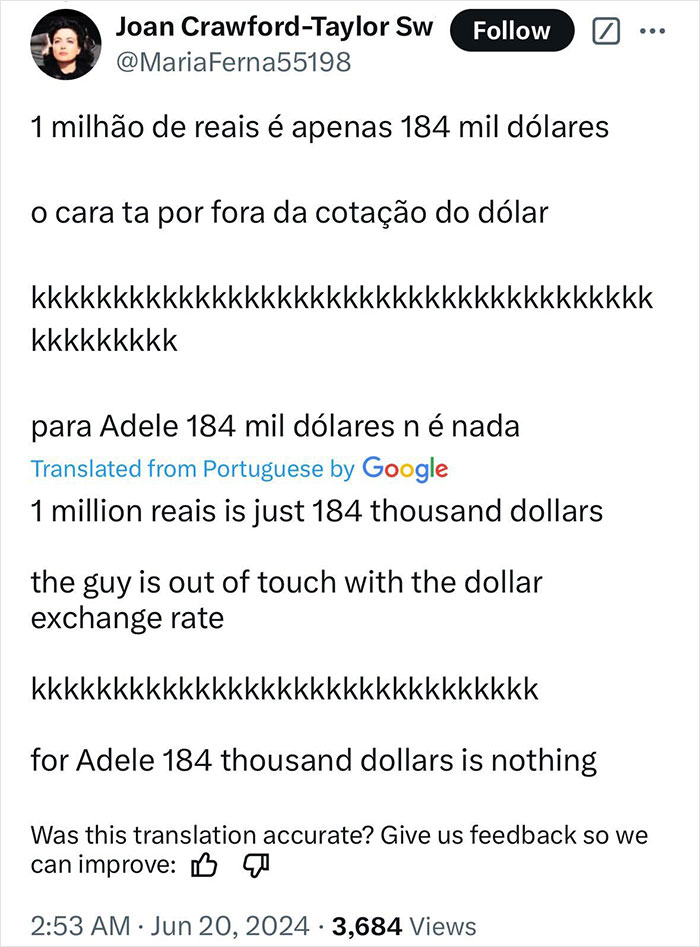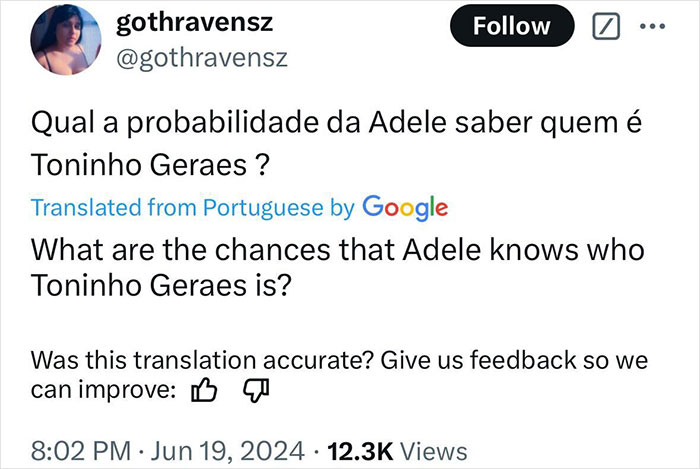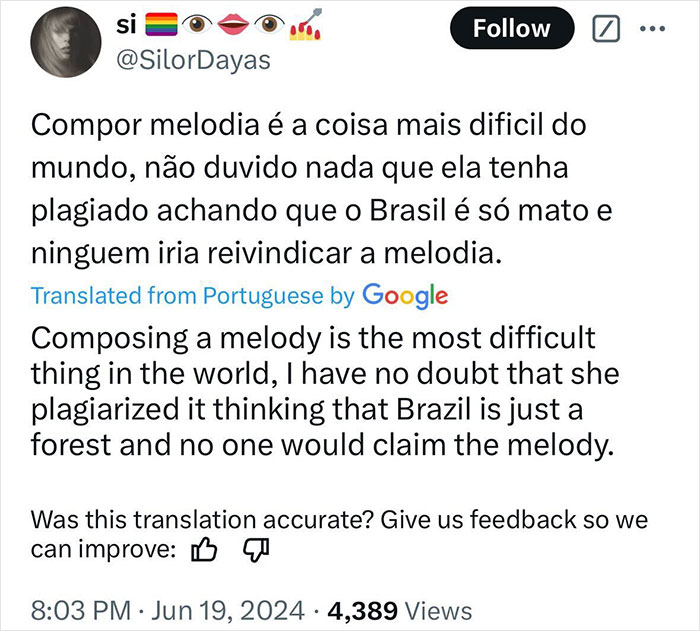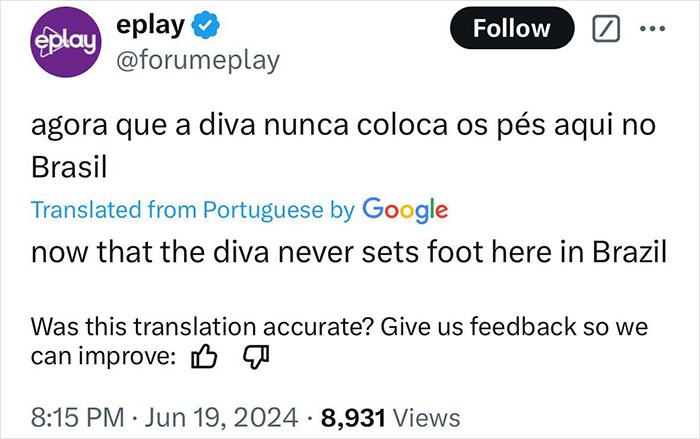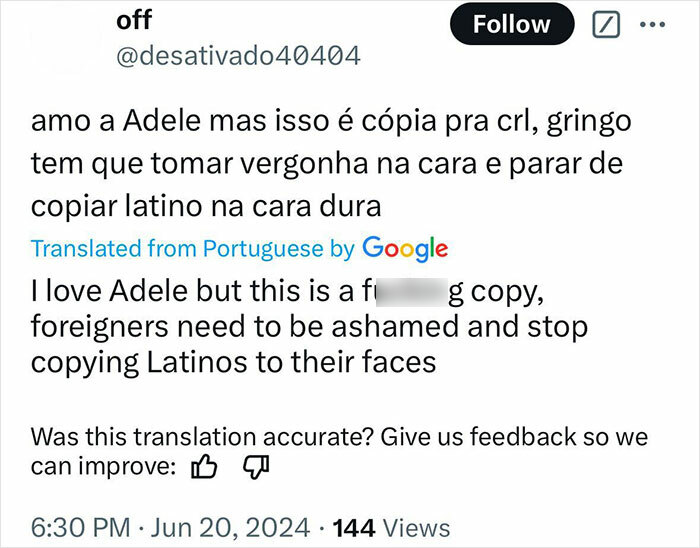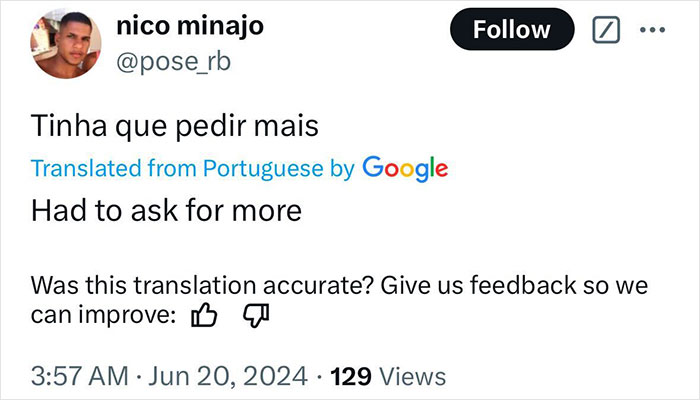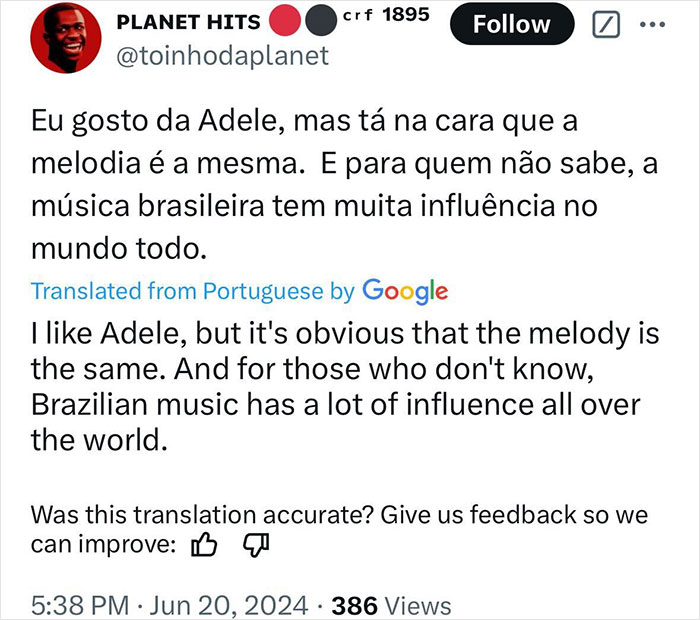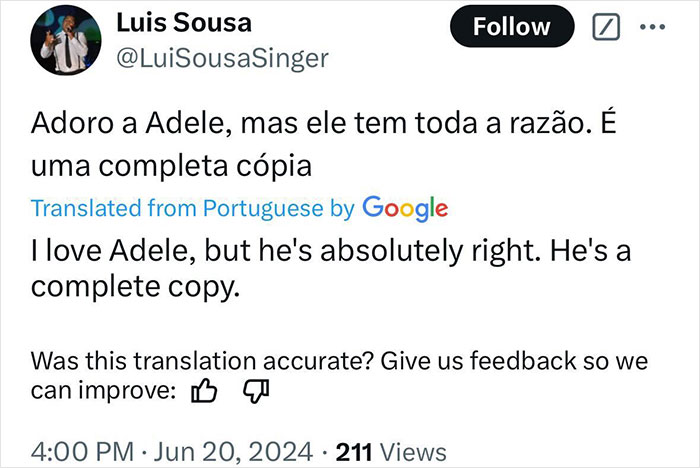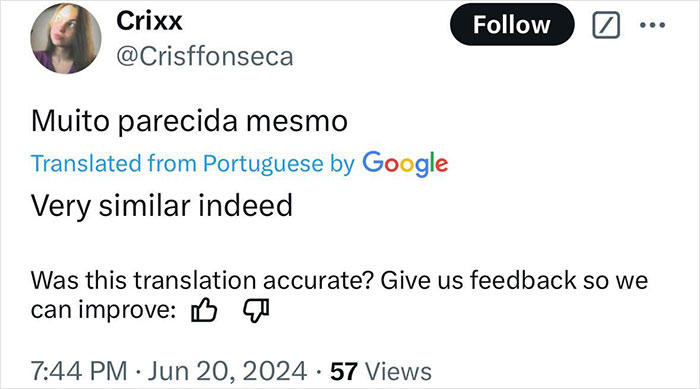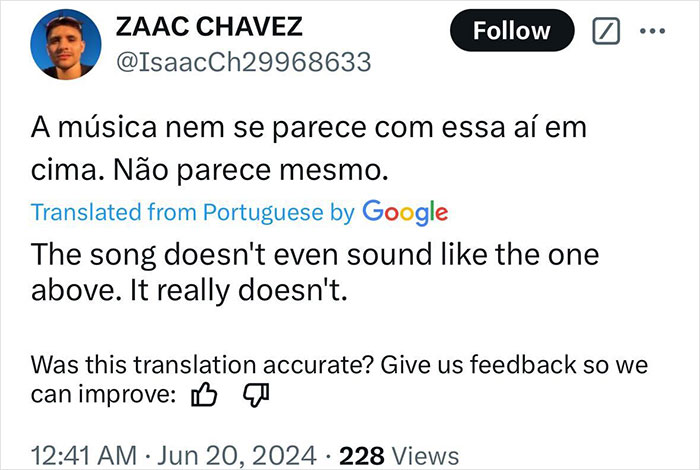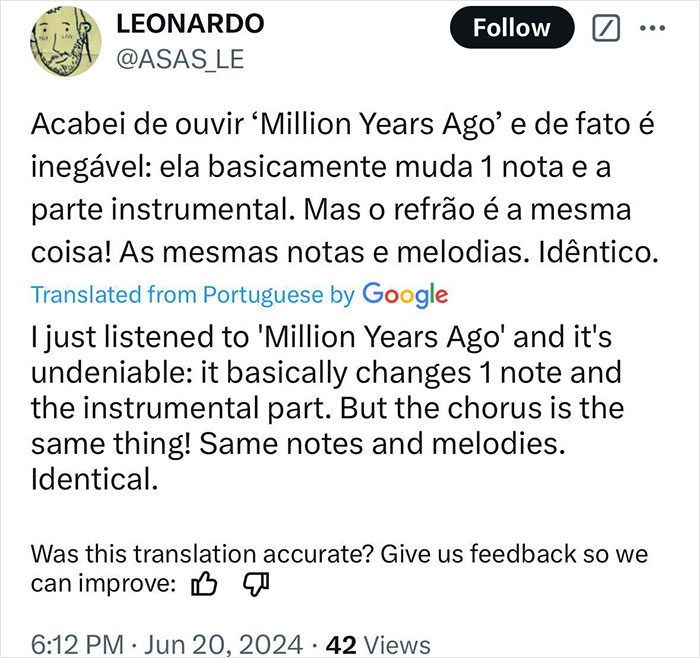A judge in Brazil has ordered Adele’s song Million Years Ago to be removed globally from streaming services due to a plagiarism claim by Brazilian composer, Toninho Geraes.
Geraes alleges that the song plagiarized the music of his 1995 song Mulheres (Women), which Brazilian artist Martinho da Vila sang on his album Tá Delícia, Tá Gostoso.
The composer is suing for lost royalties and seeking $160,000 in moral damages. He also wants songwriting credits for the samba track, which he believes the Hello singer copied.
A judge in Brazil has ordered a 2015 Adele song to be withdrawn from streaming platforms due to a plagiarism claim

Image credits: adele
Judge Victor Torres has ordered the Brazilian subsidiaries of Sony and Universal to halt “immediately and globally, from using, reproducing, editing, distributing or commercializing the song Million Years Ago, by any modality, means, physical or digital support, streaming or sharing platform,” AFP reported Monday (December 16).
“It is a landmark for Brazilian music, which … has often been copied to compose successful international hits,” Fredimio Trotta, Geraes’ attorney, was quoted as saying by AFP.
“International producers and artists who … have Brazilian music ‘on their radar’ for possible parasitic use will think twice, given this decision.”

Judge Torres’s injunction threatens Sony and Universal, the singer’s labels, with an $8,000 fine “per act of non-compliance.”
The major music companies can, however, appeal the Judge’s decision.
Trotta said his firm would work to notify streaming services, radio, and television broadcasters of Judge Torres’ ruling.
Martinho da Vila, 86, is regarded as one of the main representatives of samba music and MPB (música popular brasileira, or Brazilian popular music), and is considered one of the top exponents of samba to have ever lived. Throughout his career, he has released over 40 studio albums.
Composer Toninho Geraes alleges that Adele’s Million Year Ago plagiarized his 1995 song Mulheres, performed by Martinho da Vila

The song Million Years Ago was included on Adele’s third studio album, 25, which sold over three million copies in its first week in the US and earned her five Grammy awards, including Album of the Year.
The acoustic tune was written by Adele and Greg Kurstin, with production of the song provided by the latter.
Toninho Geraes processa oficialmente Adele por suposto plágio e pede R$ 1 milhão.
A cantora está sendo acusada de copiar a melodia de “Mulheres”, de Martinho da Vila, em “Million Years Ago”. pic.twitter.com/C6xLy90TeQ
— ACERVO (@AcervoCharts) June 19, 2024
On her 2015 Adele at the BBC special, with Graham Norton, the performer said the song expressed the nostalgia that she felt for her pre-fame days.
“It’s kind of a story about … I drove past Brockwell Park, which is a park in South London I used to live by. It’s where I spent a lot of my youth,” she explained.
“It has quite monumental moments of my life that I’ve spent there, and I drove past it and I just literally burst into tears. I really missed it, for no other reason than we’ve all got different things going on…”
The track was featured on the singer’s Grammy-winning album, 25

Image credits: Adele
Reacting to a clip of the two songs, many netizens agreed that Adele’s and da Vila’s melodies sounded similar.
“I like Adele, but it’s obvious that the melody is the same. And for those who don’t know, Brazilian music has a lot of influence all over the world,” one user wrote.
“The melody is identical… I don’t know if it was intentional, but it’s the same,” another added.
“What are the chances that Adele knows who Toninho Geraes is?” a third wrote, referencing the composer.
A separate user said: “I just listened to Million Years Ago, and it’s undeniable: it basically changes 1 note and the instrumental part. But the chorus is the same thing! Same notes and melodies.”

Brazil signed the Berne Convention, which agrees with international protection for copyrighted works. Adopted in 1887, the convention is the primary international treaty governing copyright law.
To learn more about how copyright cases are handled, Bored Panda has reached out to Andrew Leff, attorney and Associate Professor in the Music Industry Department at the USC Thornton School of Music.
“The Berne Convention is an international treaty which governs the applicability of copyright in each member state,” Leff explained.
“It is mostly an administrative treaty that governs reciprocity (copyright in one member state must be recognized in all signatory states), copyright registration, rights that must be recognized (adaptations, public performance, reproduction, etc.), and moral rights.
“The generally accepted method for proving copyright infringement requires a two-part test.” the expert added. “Did the accused have access to the original song, and are the songs ‘substantially similar.’”
The British star said the song is about the places where she “spent a lot of [her] youth”

The “substantially similar” standard has become incredibly flexible over time, Leff notes. “It has proven quite vexing, and has been so diluted over the years (culminating in the chilling Blurred Lines decision) that it is essentially a meaningless standard, subjectively determined, and not requiring any intent on the part of the infringer (‘subconscious plagiarism’).”
Blurred Lines was at the center of a legal battle that lasted from 2013 to 2018. Marvin Gaye’s family sued the hit song’s creators, Robin Thicke and Pharrell Williams, accusing them of plagiarizing Gaye’s 1977 song Got To Give It Up.
Although the songs differed in melody and rhythm, a federal jury found that Thicke and Williams had committed copyright infringement. (The artists later settled the case for $5 million.)
The question of infringement has become diluted over the years and reduced to “the ear of the beholder,” explains Andrew Leff, Professor in the Music Industry Department

According to Leff, most infringement cases are settled out of court. The outcome of those that do go to trial are generally determined by juries, rather than a single judge.
“I’m not certain what standards this judge in Brazil used to determine plagiarism, nor am I certain what jurisdictional limits exist for a unilateral determination in a single country.
“It is important to note that this is a preliminary injunction, which allows Adele’s label and publisher to appeal the decision before any enforcement.”
The professor believes Adele’s and Geraes’ case exemplifies how ambiguous copyright infringement laws “reduce the question of infringement to the ear of the beholder.”

Dr. E. Michael Harrington, a professor in music copyright and intellectual property matters at Berklee Online, believes that Geraes’ claim does not constitute a case of copyright infringement.
“I feel strongly that this is NOT an example of copyright infringement as original material has NOT been copied. Both songs use a well-known standard chord progression that is based on the ‘ascending series of 4ths.’ Chord progressions based on the ascending series of 4ths are common in many jazz and pop/rock songs, and can be traced back to Mozart, Bach and earlier,” the music copyright expert told Bored Panda.
Dr. Harrington further explained: “A judge in Country X generally does not have the authority to directly order the removal of an allegedly infringing work from streaming services in other Berne Convention countries. The judge’s jurisdiction is primarily limited to their own country.
“However, a court ruling in Country X finding infringement could have persuasive or indirect effects. For example: If a major platform like YouTube or Spotify is headquartered or has significant operations in Country X, a court order there might influence their global actions. A successful lawsuit in one country could encourage copyright holders to pursue similar actions in other jurisdictions.
He added: “International cooperation through organizations like WIPO (World Intellectual Property Organization) can facilitate dispute resolution.
“In essence, the Berne Convention establishes a framework for international copyright protection, but enforcement often requires navigating multiple legal systems. It also sets a minimum standard, so some countries may offer longer terms than the required minimums.”
Bored Panda has contacted Adele’s representatives for comment.
Many people agreed that both songs sounded similar
